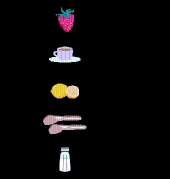





Paul Cereghino- Ecosystem Guild
Maritime Temperate Coniferous Rainforest - Mild Wet Winter, Dry Summer





Each scale of organization organizes the smaller scales, but also has unique emergent properties. While the forest affects what trees grow where, the forest itself has properties that are uniquely provided only when trees grow in groups.
Complexity increases as you try to understand larger and larger scales of organization. The forest is more complicated that a single tree, as forest is made of hundreds of individual trees interacting over time. So far so good.
The larger scales of organization depend on the smaller scales. So in order to have a forest you need trees, if you cut down all the trees you don't have a forest. Check.
However the smaller scales of organization are controlled by larger scale patterns. So where and how a tree grows is strongly affected by the structure created by the collective of trees known as a forest. Kind of the inverse of three.
Thus for any particular scale of organization, its purpose is defined by larger scale systems, but its mechanisms are defined by smaller scale systems. Just as Brubaker instructed me, to understand what the forest is responding to (its purpose) you need to understand a landscape of microclimates and disturbances. To understand how it responds you must understand the physiology and life history of individual trees. That wraps together three and four.
A disturbance at a particular scale reverberates through all other scales, though Feibleman himself suggests that some organizations are more tightly integrated than others.
At higher and higher levels of organization, the ability to change the organization itself can occur with increasing speed. What?! So, the cell of a tree may take millennia to alter its form through genetic selection. The structure of a forest can change with a single wind storm. Big complicated things are fragile.
There are greater numbers of small organizations than large organizations. Good easy again, there are more trees than forests.
You cannot fully explain the larger organization by examining its smaller constituents. There are properties unique to the configuration and composition of trees within a stand that are not explainable by looking at a single tree, pointing to the fundamental risk of reductionism.
The properties of a level of organization distort the structure of smaller levels. He's getting a little weird again. The climate created by a forest can affect the growth, form and survival of individual trees.
An event at any scale of an organization affects all other levels. A perhaps excessively nuanced extension of rule six.
Whenever an organization is affected it in turn has an effect. Creating the potential for feedbacks, and cycles.
Paul Cereghino- Ecosystem Guild
Maritime Temperate Coniferous Rainforest - Mild Wet Winter, Dry Summer




Paul Cereghino wrote:
What exactly makes Permaculture so special?!
Idle dreamer




homesteadpaul





Paul Cereghino- Ecosystem Guild
Maritime Temperate Coniferous Rainforest - Mild Wet Winter, Dry Summer






|
Arthur, where are your pants? Check under this tiny ad.
The new permaculture playing cards kickstarter is now live!
https://www.kickstarter.com/projects/paulwheaton/garden-cards
|




